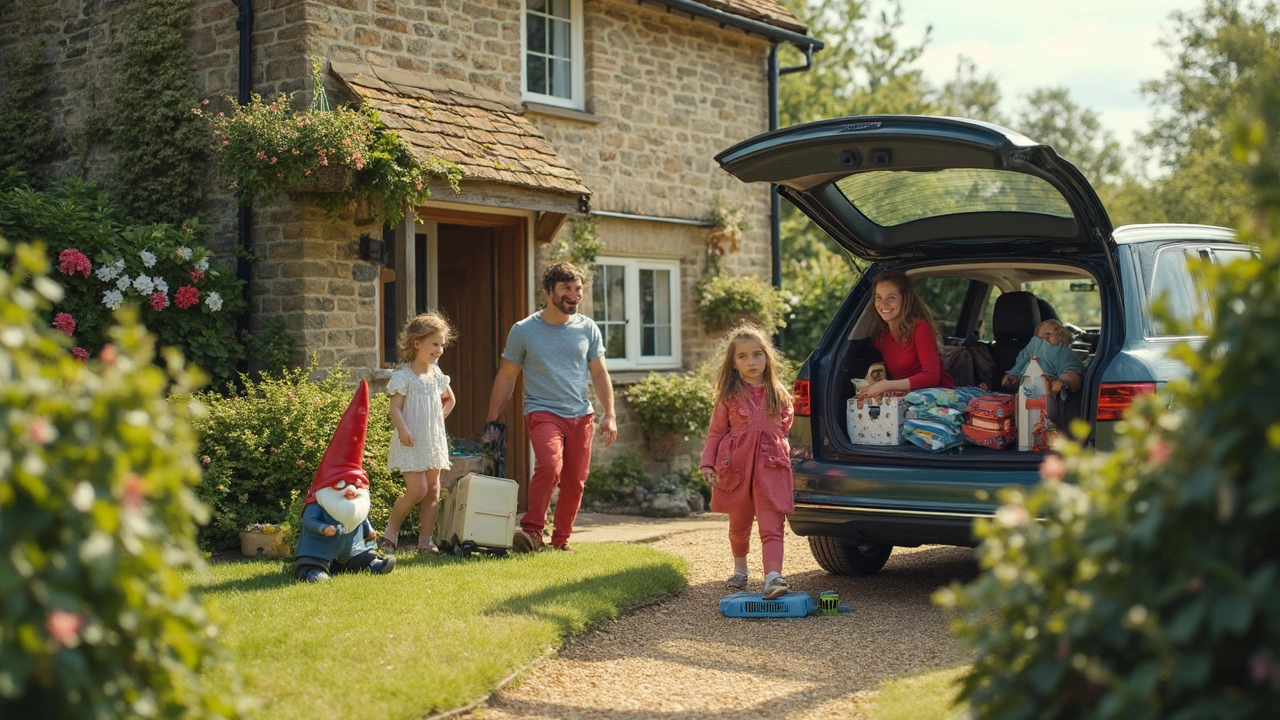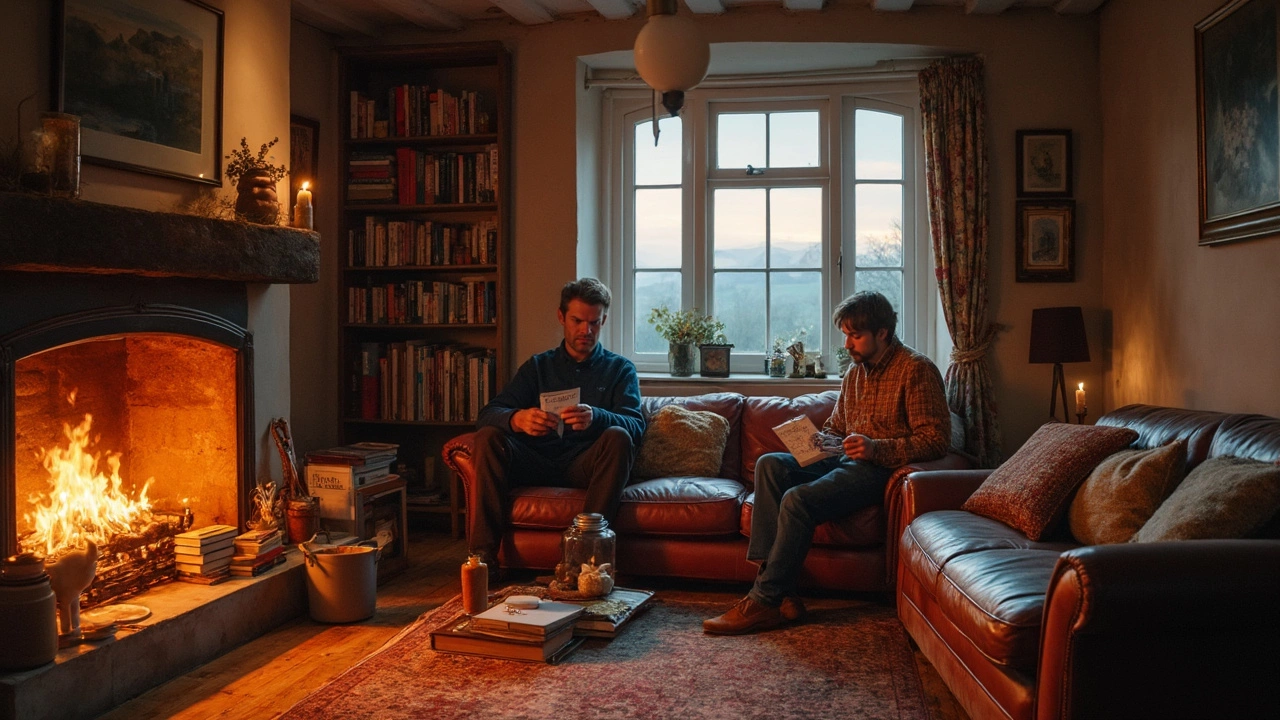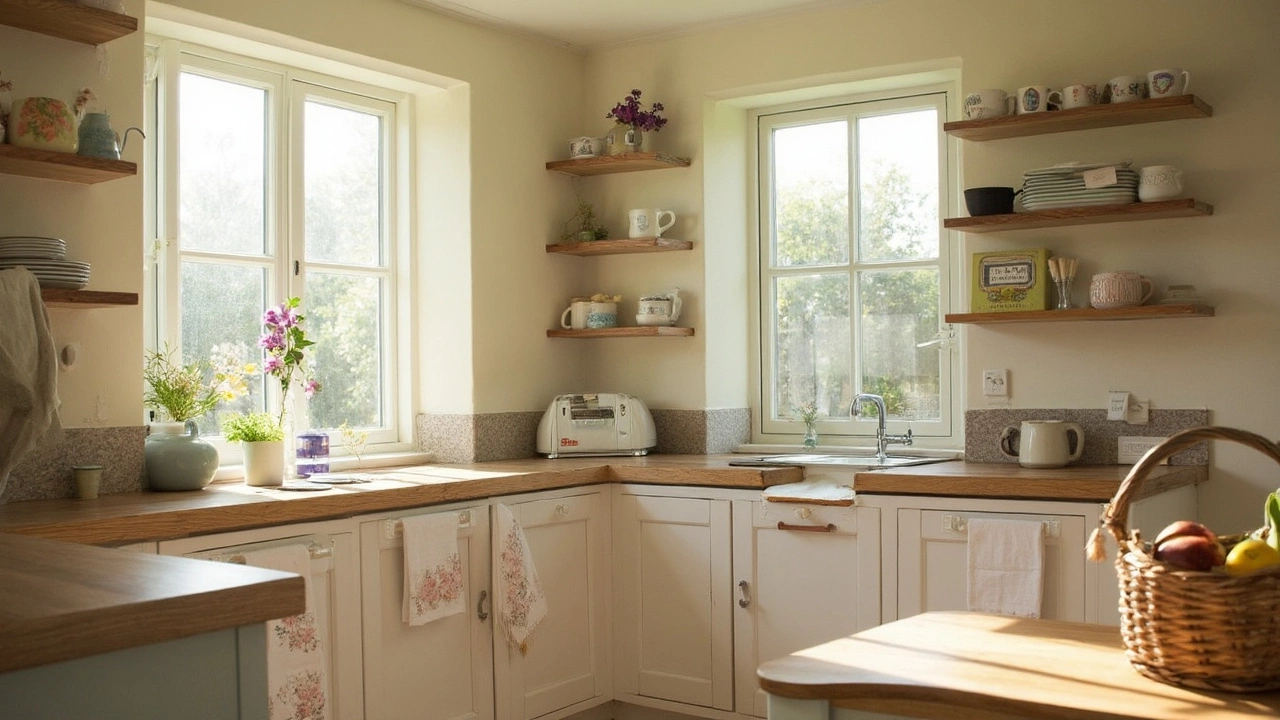When you roll up to a self-catering cottage, don’t expect those tiny hotel shampoos or a breakfast buffet waiting for you. The whole point is that you get your own space and the freedom to set your own schedule, but you also need to tick a few more boxes before you relax. Most places hand you the keys and leave you to it, which can be awesome if you’re after privacy, a real kitchen, and a base that doesn't feel like a hotel room.
Don’t just toss your bag in the car and hope it all works out. A lot of cottages supply the basics—think pots, pans, a fridge, cutlery, and plates—but what’s included can really vary. Some properties go the extra mile with a welcome basket or pantry staples like salt and oil (always a win). Other times, you'll find nothing more than a bare cupboard and a kettle. That’s why it pays to double-check the booking info or even message your host with questions before you set off.
- The Self-Catering Setup: What’s Actually Provided?
- Kitchen Gear: Tools, Gadgets, and Stock
- Bedrooms and Bathrooms: Comfort and Essentials
- Food, Cleaning, and Local Supplies
- Making the Most of Your Stay: Tips for a Hassle-Free Experience
The Self-Catering Setup: What’s Actually Provided?
So, what do you really get when you book a self-catering cottage? There's no universal checklist, but most modern stays stick to some basics. You’ll nearly always get a kitchen with a fridge, stove or hob, microwave, and basic cookware. Think frying pans, saucepans, and probably a chopping board. Cutlery and crockery, like plates, mugs, and glasses, are standard too. It’s rare to find anything fancy, but you’ll usually have what you need to cook a proper meal.
For sleeping, expect proper bedrooms, real beds (not sofa beds unless listed), and bedding provided. Most cottages include linen and towels these days, but double-check—some budget spots expect you to bring your own or charge extra for a linen pack. In the bathroom, starter toiletries like hand soap or a roll of toilet paper are typical, but you won't find a full hotel range of goodies. You might want to pack your favorite shampoo and a few extras.
WiFi is pretty common now, even in rural spots, but the quality can be iffy. TV, maybe a DVD player, and basic cleaning tools (like a broom and vacuum) also make the list. Some hosts toss in a welcome basket, but don't count on it everywhere—always ask if that’s important to you. Here’s a quick look at what you’ll probably find versus what you might want to bring yourself:
- Usually Provided: Kitchen basics (pots, pans, cutlery, crockery), fridge, oven/hob, kettle, toaster, bedding, towels, heating, electricity, cleaning stuff (washing up liquid, sponge), WiFi, some toiletries.
- Might Not Be Provided: Pantry items (oil, salt, sugar), extra toilet paper, laundry detergent, full set of toiletries, specialty cooking gadgets, welcome basket.
| Item | Often Provided | Occasionally Missing |
|---|---|---|
| Bedding & Towels | 85% | 15% |
| Kitchen Basics | 95% | 5% |
| WiFi | 70% | 30% |
| Starter Toiletries | 60% | 40% |
Double-checking your booking details is the best way to know what you’re getting and avoid surprises. Hosts are used to these questions, so don’t feel awkward—shoot them a quick message if anything’s unclear.
Kitchen Gear: Tools, Gadgets, and Stock
If you’re banking on whipping up a meal, it pays to know exactly what comes in the kitchen. Most self-catering cottages give you the basics: a stove, oven, microwave, fridge, and sometimes a freezer. The real surprise is in the little stuff. Not every place stocks sharp knives or enough pans for a big breakfast, so it’s smart to ask or check the listing pictures before you pack up the groceries.
Here’s what you’ll usually find:
- Pots and pans (usually one big and one small, nothing fancy)
- Cutlery and plates for the number of beds
- Cups, glasses, and maybe wine glasses if you’re lucky
- Kettle and toaster (pretty much everywhere now)
- Basic utensils: spatula, frying spoon, sometimes a whisk
Extras like a blender, slow cooker, or even a cheese grater? Don’t get your hopes up unless it’s spelled out. Most places avoid complicated gadgets since people tend to break or forget to clean them. If you have a favorite coffee maker, bring it along or check if one is provided. Not every property has a coffee machine—or even a coffee plunger—so if you’re picky, bring your own stash.
When it comes to pantry stock, don’t expect a full larder. Even salt and pepper can be hit or miss. A lot of hosts now leave a starter pack: maybe a bit of tea, sugar, coffee, or even a biscuit pack. But if you plan to cook proper meals, pack your own oil, seasonings, and those specialty spices you always need. Supermarkets or village shops near cottage spots sometimes close early or aren't packed with choice, so coming prepared saves time and standing in line.
One more thing—check about dish soap, sponges, and trash bags. These essentials are often provided but not always in generous amounts. Disposable BBQs or picnicware are handy for summer stays but rarely stocked, so bring them if outdoor meals are on your list.
Having the right self-catering setup is all about booking smart and packing what the property doesn’t provide. Quick checklists and a couple of questions to your host go a long way toward an easy kitchen experience.

Bedrooms and Bathrooms: Comfort and Essentials
What you find in the bedrooms and bathrooms of a self-catering cottage can make or break your stay. Cottages aren’t hotels, so the setup can swing from super comfy to bare basics. Most self-catering places will give you bedding—sheets, duvets, and pillows are standard, but it’s smart to double-check. Sometimes you still need to bring your own towels or even pillowcases, especially if you’re booking last minute or with a less established host.
If you’re someone who cares about mattress comfort, feel free to ask what kind of beds are in the cottage. Some have plush king-size beds; others might still have the old-school singles with springs that squeak at every turn. It’s not rude to ask. Also, check if blackout curtains are fitted. Not everyone likes to wake up with the sunrise, especially in the UK during summer when it gets light at 4am.
Bathrooms are another area where the details matter. Most places have private bathrooms, but some old country cottages still have shared facilities. Here’s what you’re likely to find in the average self-catering cottage:
- Hot water with decent water pressure—although rural spots sometimes have low pressure, so ask ahead if this is important to you.
- Basic towels and toilet roll for your first night, but usually you’ll need to buy more if you’re staying longer.
- Hand soap provided sometimes, but don’t count on shampoo, shower gel, or extras like a hair dryer.
- If you're staying for a week or more, laundry access (washer or dryer) may be included, but not always. Always check the listing.
Here’s a quick rundown on what to expect in most UK self-catering holiday rentals:
| Item | Usually Included | Sometimes Included | Rarely Included |
|---|---|---|---|
| Bedding (sheets, duvets, pillows) | ✔️ | ||
| Towels | ✔️ | ||
| Toiletries (shampoo, shower gel) | ✔️ | ||
| Hair dryer | ✔️ | ||
| Toilet paper (starter supply) | ✔️ | ||
| Blackout blinds or curtains | ✔️ | ||
| Extra blankets | ✔️ | ||
| Laundry facilities | ✔️ (long stays) |
You get the freedom to make the space your own, but you’re also the one responsible when the towel runs out or if you want extra pillows. Planning helps dodge the little headaches. If you’re unsure about what’s included, don’t be shy—hosts are used to these questions and would rather answer up front than try to sort it out after you’ve arrived. For self-catering trips, packing an extra towel and some mini toiletries usually pays off, just in case.
Food, Cleaning, and Local Supplies
When you book self-catering accommodation, most places have kitchens stocked with tools, but you’re usually in charge of the food. Don’t expect a pile of groceries in the fridge. A few hosts leave welcome treats like bread and milk—awesome if you’re arriving late—but it’s not something you can bank on. If there’s a welcome pack, it’ll probably say so in the listing. Otherwise, make a pit stop at a local shop on your way or plan a quick shop after you get the keys.
The cleaning stuff is another thing people forget. Cottages usually have basics—think a broom, a mop, maybe dishwasher tablets and some bin bags. But shampoo, shower gel, and laundry pods? Bring your own, just in case. If you’re staying more than a couple nights, you’ll want enough to cover the week. Towels and bedding are usually included, but it’s smart to check, especially in rural spots where grabbing extras isn’t easy.
Most places ask that you leave the property clean and tidy. You’re not expected to deep-clean, but a quick sweep, dishwasher on, and rubbish out covers the basics. Some cottages add a small cleaning fee, while others expect you to do your bit before checking out. Here’s roughly what you’ll find supplied, based on what British travelers say is pretty standard:
| Item | Usually Provided? |
|---|---|
| Salt, pepper, oil | Sometimes |
| Tea/coffee basics | Usually |
| Bin bags | Usually |
| Washing up liquid | Often |
| Dishwasher tablets | Sometimes |
| Loo roll | Usually (starter supply) |
Here’s a quick tip: check out local farmers’ markets and shops. You’ll often get fresher and cheaper produce than the big chains. In cottage-heavy areas like Cornwall or the Lake District, some places have partnerships with local food suppliers who can deliver a breakfast box right to your door. It’s a game changer if you want to wake up to streaky bacon and farm eggs without leaving your pyjamas.
One last thing—rubbish and recycling rules are different everywhere, right down to what colour bin to use. Check your welcome folder or info sheet for local rules so you don’t end up with a pile of bottles after the neighbours have already put everything out for collection. That little bit of planning means less stress and more time for relaxing (or exploring the countryside).

Making the Most of Your Stay: Tips for a Hassle-Free Experience
If you want your trip to run smoothly, a little bit of planning makes all the difference in self-catering cottages. There’s nothing worse than arriving hungry and realising you’re missing coffee, or turning up with just shorts to find the weather turned chilly overnight.
First, check what’s already on site before you pack. Hosts usually list what’s there, but sometimes it’s out-of-date. Shoot them a quick message to confirm things like hairdryers, Wi-Fi, or if there’s a high chair for your toddler. It’s better to ask than arrive disappointed.
- Bring the food basics—milk, bread, tea, coffee, and breakfast stuff—so you’re set from the first morning. Farm shops or small groceries close early in many rural spots, especially on Sundays. If you arrive late, even grabbing takeout on the drive can save you a grumpy start.
- Check whether you'll need cleaning supplies. Some cottages provide dishwasher tabs, bin bags, and washing-up liquid, but not always enough for a week. Toss a couple extras in your bag just in case.
- Layer up your clothing. Even in summer, UK countryside evenings can feel surprisingly cool. Pack a jumper and waterproof jacket—even if the weather app says it’ll be sunny. Local weather can change fast.
- Plug adapters and charging cables are easy to forget. With many older cottages, you won’t find USB sockets, so chuck in at least one adapter for your gear.
- Remember the fun stuff! Board games, a deck of cards, books, or a Bluetooth speaker can make evenings way better if there’s no TV streaming or spotty reception.
If you want the best out of the self-catering experience, ask locals (or your host) for insider tips—like the best fish and chips nearby or hidden walks you won’t find in the guidebook. You’ll often get friendlier advice than you would at a hotel.
Stick to the recycling and bin guidelines posted by your cottage—waste collection differs in each area and unexpected charges can pop up if things are left wrong. And before you check out, make sure you haven’t left anything in the fridge or under the bed. Quick room sweeps can spare you from losing chargers, passports, or your favorite hoodie.
